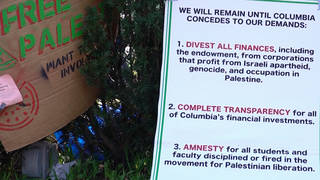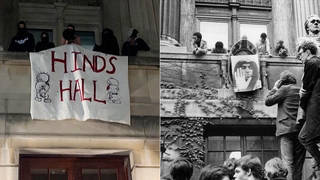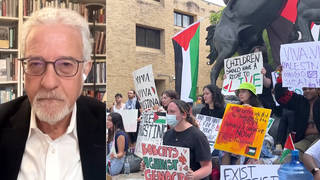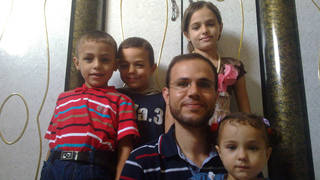
Related
Guests
- Mohammad KhatamiGoogle software engineer working with the No Tech for Apartheid campaign.
- Ray WestrickGoogle worker-organizer with the No Tech for Apartheid campaign.
- Gabriel Schubinerformer software engineer at Google Research and an organizer with the No Tech for Apartheid campaign.
Democracy Now! speaks with two of the Google employees who were arrested staging sit-ins on Tuesday at the company’s offices in New York City and in Sunnyvale, California, to protest the tech giant’s work with the Israeli government. Organized by the group No Tech for Apartheid, the protesters are demanding Google withdraw from Project Nimbus, a $1.2 billion contract to provide cloud computing services to the Israeli military. “Google execs basically chose to arrest workers for speaking out against the use of our technology to power the first AI-powered genocide,” says Google software engineer Mohammad Khatami, who was arrested in New York. Google worker-organizer Ray Westrick, who was arrested occupying CEO Thomas Kurian’s office, says “more people are willing to organize and risk their jobs in order to take a stand against complicity in genocide.” We also speak with No Tech for Apartheid organizer and former Google worker Gabriel Schubiner, who calls on the tech industry to divest from Google and Amazon services. “Technology workers actually have a lot of power to shift this paradigm and to remove technology from this deep complicity with the Israeli occupation,” Schubiner says.
Transcript
AMY GOODMAN: This is Democracy Now!, democracynow.org, The War and Peace Report. I’m Amy Goodman in New York, with Juan González in Chicago.
Several Google employees, at least nine, were arrested Tuesday evening after staging sit-ins at the company’s offices in New York and in California to protest the tech giant’s work with the Israeli government. The sit-ins, organized by the activist group No Tech for Apartheid, took place at Google Cloud CEO Thomas Kurian’s office in Sunnyvale, California, and the 10th floor commons of Google’s New York office, which is right around the corner from Democracy Now!
Protesters are calling for Google to withdraw from a $1.2 billion contract to provide cloud computing services to the Israeli government, known as Project Nimbus. Last week, Time magazine reported Google’s work on the project involves providing direct services to the Israeli military.
The sit-ins were accompanied by outdoor protests at the Google offices here in New York and in Sunnyvale, San Francisco and Seattle, Washington. Workers and outside activists have opposed the contract since it was signed in 2021, but protests have ramped up over the past several months since Israel’s latest bombardment of Gaza.
No Tech for Apartheid says Google is enabling and profiting from Israel’s use of artificial intelligence to develop a “kill list” to target Palestinians in Gaza for assassination with little human oversight. The Israeli military is also using Google Photos for facial recognition across Gaza and the West Bank to identify and detain Palestinians en masse.
No Tech for Apartheid has published an open letter, co-signed by 18 other groups, that demands Google and Amazon immediately cancel their work on Project Nimbus. The letter has gathered more than 94,000 signatures from the general public.
For more, we’re joined by two of the arrested Google workers. Ray Westrick is with us. She’s a Google worker-organizer with the No Tech for Apartheid campaign, among the workers who occupied Google Cloud CEO Thomas Kurian’s office in Sunnyvale, California. She’s joining us from Sunnyvale. And here in New York, we’re joined by Mohammad Khatami, a Google software engineer who was arrested at the sit-in at Google’s office in New York. He’s joining us along with Gabriel Schubiner, a former software engineer at Google Research and an organizer with the No Tech for Apartheid campaign. And before that, he was with Jewish Diaspora in Tech.
We welcome you all to Democracy Now! Mohammad, let’s begin with you. You were, just hours ago, in the jail —
MOHAMMAD KHATAMI: That’s right.
AMY GOODMAN: — in the local police precinct. Talk about why you were willing to get arrested.
MOHAMMAD KHATAMI: Yeah. Well, rather than, you know, consider the demands that we’ve been raising for years now and listening to workers and considering the things that we’ve been raising, Thomas Kurian and Google execs basically chose to arrest workers for speaking out against the use of our technology to power the first AI-powered genocide. So, we were willing to get arrested for that, because at this point we aren’t willing to be lied to by our higher-ups anymore. We aren’t willing to be disrespected by our higher-ups anymore. And we wanted to take that to the offices and make sure it was understood by them, yeah.
JUAN GONZÁLEZ: How do you sense is the support that you have among other Google workers, the degree of the dissatisfaction with the policies of Google?
MOHAMMAD KHATAMI: Yeah. I mean, Google has done a really good job at creating a culture of fear and retaliation against workers in general. But what we noticed was beautiful. So many people came up to our sit-in and basically showed support and felt that they were inspired by the work that we were doing, and felt inspired to speak out, which is exactly what we were going for. We want workers to feel like we have the power to choose where our technology is going and who we’re contributing to. So I felt really happy to see that, yeah.
AMY GOODMAN: Ray Westrick, you’re on the West Coast. You were arrested in California. Talk about this Project Nimbus and why you were willing to get arrested, and what the response — were you in the offices of the Google Cloud CEO?
RAY WESTRICK: Yes, we sat in at the office of Thomas Kurian, the Google Cloud CEO, to protest Project Nimbus, which is a $1.2 billion contract with the Israeli government and military between Google and Amazon. We also were demanding the protection of our co-workers, especially our Palestinian, Arab and Muslim co-workers, who have been consistently retaliated against, harassed and doxxed for speaking out about Project Nimbus and, you know, the humanity of Palestinians. So, we were there in solidarity with them. We were there to protest the contract, which is being directly sold — providing technology directly to the Israeli military as it inflicts a genocide on Palestinians in Gaza. And yeah, that is why we chose to sit in Thomas Kurian’s office.
JUAN GONZÁLEZ: And, Ray, could you — was there any response from the CEO or his office? And are you concerned about losing your job? Why — when did you decide to take this action?
RAY WESTRICK: Yeah. We did not receive any response from the CEO. And I think it’s really telling that they would rather let us sit there for over 10 hours and arrest us for peacefully sitting in his office than have leadership engage in our demands in any way at all. So, we’ve received no response from the CEO, and we were forcibly removed by the police.
And I — working at Google has been, you know, an honor. I really love my team. I love the work I do. But I can’t in good conscience not do anything while Google is a part of this contract, while Google is selling technology to the Israeli military, or any military. And so, it was a risk I was willing to take, and I think it’s a risk a lot of my co-workers are willing to take, because a lot of people are really agitated about this and have consistently made their demands clear and have faced retaliation for it. So, I chose to sit in, knowing the risks, out of care for the use of our technology, out of care for the impact of our technology and care for my co-workers.
AMY GOODMAN: For our radio audience, I wanted to let people know that Ray is wearing a T-shirt that says “Googler against genocide,” with “genocide” in the famous multicolor of “Google,” that it’s so well known for. I wanted to bring Gabriel Schubiner into this conversation, a former software engineer at Google Research, an organizer with the No Tech for Apartheid campaign, and ask you — you know, we had you on more than a year ago — this is before Israel’s latest attack on Gaza — talking about exactly this. And you were with a Jewish organization of Google workers at that time speaking out. Talk about the whole history of Project Nimbus.
GABRIEL SCHUBINER: Yeah.
AMY GOODMAN: And the resistance against it.
GABRIEL SCHUBINER: Yeah. Thank you so much.
So, Project Nimbus was signed in May of 2021 while bombs were being dropped on Gaza, while Palestinians were being evicted from Sheikh Jarrah and beaten at Al-Aqsa Mosque. That was really a point — when we found out about Project Nimbus, personally, for me, it was a turning point, where I no longer felt able to continue doing my work without engaging and organizing. There was a group of people that felt very similarly, so we started a petition. We were connected, got connected with Amazon workers, with community organizations, Jewish Voice for Peace and MPower Change, and spun a campaign out of that.
I want to be clear: Like, the campaign really is driven by worker concerns and worker needs around the ethical use of our labor, as well as the direct workplace concerns of the, like, health and safety concerns around working at a company that is facilitating genocide. We’ve known for a long time that this project was directly targeted at the military. It’s been reported in press that Google was giving trainings directly to the IOF. We know that Google gave trainings directly to Mossad. We know that the IOF —
AMY GOODMAN: When you say ”IOF,” explain the term.
GABRIEL SCHUBINER: I’m sorry, the — yes.
AMY GOODMAN: Because people are used to hearing ”IDF,” Israeli Defense Forces.
GABRIEL SCHUBINER: Right, yes. Yeah, it’s Israeli occupation forces, just to indicate, so we’re not repeating their messaging that their really aggressive repression of Palestinians is an act of defense. We know that it’s an act of occupation, so we say ”IOF.”
And so, we’ve known for a long time that this project was directly targeted at the Israeli military. But it was only recently, through this last contract that Google signed directly with the IOF, that we recognized that Google was really doubling down, that this contract is directly intended to facilitate military use. And we know that Google was chosen over other companies because of the advanced AI technology that they’re able to offer. So, given that we’ve learned how the IOF is using AI in this war, we really see this as like a really critical campaign for Palestinian liberation.
To speak to your point about the resistance against the project, we’ve been working against this project as workers for — since it was signed three years ago. We have been doing organizing. We have been doing, you know, base building and labor organizing. We’ve had protests externally and internally. We’ve had signed petitions. We’ve done outreach to our executives through internal forums, through chatrooms, through every available means, because, I think — you know, understanding, like, this contract really is — like, it really is an incredible issue for our work, like, all workers’ labor at Google. So many workers’ labor is contributing directly to this project, because all of the technology at Google is like deeply intertwined with each other. So, yeah, so we see this as really important, yeah.
JUAN GONZÁLEZ: Well, Gabe, I wanted to ask you — the average person, who’s not a Google worker, who might support your stand and who uses Google multiple times a day around the world, what are you calling for them to do?
GABRIEL SCHUBINER: Right. So, I mean, we’re calling for everyone around the world to really, like, help us with awareness, like, help us make it known that Google is a war profiteer. I think Google is so deeply embedded in people’s lives — right? — that it’s hard to ask for a boycott. But I think we’re calling specifically on people in the tech industry to divest from Google and Amazon. Google Cloud services and Amazon Web Services underlie a vast majority of the internet, but there are other options. So, technology workers actually have a lot of power to shift this paradigm and to, like, remove technology from this deep complicity with Israeli occupation.
AMY GOODMAN: Mohammad Khatami, can you talk about your own family background and why you so particularly care right now about what’s going on in Gaza?
MOHAMMAD KHATAMI: Yeah, yes. So, I come from a Muslim family. I was raised Muslim. And it’s really hard to wake up seeing the images of children slaughtered and know that your — you know, the work you’re doing is contributing to this. I’ve lost sleep. It’s just been extremely difficult to focus on work and think that you’re working for something that is contributing to the mass slaughter that’s taking place. And for speaking out against that, I’ve literally been called a supporter of terrorism, which is something that —
AMY GOODMAN: Called by?
MOHAMMAD KHATAMI: You know, by co-workers and HR and people in the company, a supporter of terrorism, which is, you know, something — it’s like a schoolyard insult. It’s something I haven’t heard since middle school. And that’s just an example of the retaliation and the harassment and the hatred that we face just for speaking up against our work being used in this way.
AMY GOODMAN: Are you concerned about losing your job?
MOHAMMAD KHATAMI: Absolutely. But it doesn’t — it’s not even important to me at all compared to working for something that is meaningful and having a good impact on the planet. I don’t want to have any association with this genocide. And I would hope that Google would change their mind about it, as well.
AMY GOODMAN: And finally, Ray Westrick, where do you see this movement going from here? And can you talk more about the Jewish-Muslim alliance around this among Google workers and former Google workers?
RAY WESTRICK: Yeah. I only see this movement growing and continuing to apply pressure. We received so much support during the sit-in. I’ve received so many personal messages from people, you know, thanking me for being vocal, and asking how they can be more vocal and get more involved. So I think this is absolutely growing. I think Google knows that this will continue, that, you know, workers are very agitated about this and will continue to speak up and apply pressure. And I think that’s why it was important for them to silence us. But this movement is growing, and more people are finding out about this, and more people are willing to organize and risk their jobs in order to take a stand against complicity in genocide.
AMY GOODMAN: Well, I want to thank —
RAY WESTRICK: And yeah, I think this has been a really unifying campaign for people of all backgrounds. And I know, specifically, a lot of us came together because we were specifically concerned about how Google has treated and retaliated against our Palestinian, Arab and Muslim colleagues, especially, like Mohammad mentioned, a lot of them have experienced harassment and doxxing for speaking out in like the appropriate channels at Google and have been consistently ignored and harassed and retaliated against. And so, we had to come together to say that we can’t let this happen anymore. We have to come together in protection of our co-workers and each other and in protection of, you know, the ethical use of our technology, to make sure that we’re not building technology that’s being used for harm. So, I think it’s been a really unifying campaign that is really grounded in taking care of each other and really grounded in making a positive impact and not facilitating more harm with technology.
AMY GOODMAN: I want to thank you all for being with us. Ray Westrick and Mohammad Khatami are both Google workers who were arrested yesterday, Ray in the offices of the Google Cloud CEO in Sunnyvale, California, and Mohammad here in New York. Also Gabriel Schubiner, a former software engineer at Google Research and an organizer with the No Tech for Apartheid campaign, before that, with Jewish Diaspora in Tech.
Next up, 4,000 Volkswagen workers in Chattanooga, Tennessee, begin voting on whether to join the United Auto Workers as it tries to expand in the South. Stay with us.












Media Options